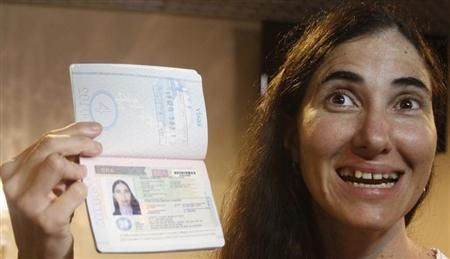
The three-month long, 13-country tour of internationally renowned Cuban blogger Yoani Sánchez will come to an end on Thursday as she returns home to Havana. She is currently attending a ceremony in Spain for this year's Ortega y Gasset Journalism Award. Sánchez won the award in 2008, but could not secure permission to leave Cuba. Since then, a landmark migration reform eliminating exit visa requirements has made it easier for Cubans to travel abroad, including Sánchez and other dissident figures who are typically boxed out of the Cuban political arena because of stances deemed excessively critical by the island nation's government.
During her trip, the 37-year-old blogger met with editors from NPR, the New York Times and El Pais, among other media organizations, and says she plans to start an independent online newspaper upon her return.
Watch video of a protest at her talk in New York City.
Her tour brought her to Brazil, Peru, Mexico, Spain, Italy, the Czech Republic, Poland, Sweden, Switzerland, Germany, Norway, Holland and the United States. She gave speeches before members of European and Latin American parliaments; she was received by Lech Walesa, the former president of Poland and co-founder of the Soviet bloc's first independent trade union; in the U.S., she met with senior members of President Barack Obama's staff and was greeted with effusive gestures of approbation during her public appearances in Miami, a historical hub of Cuban exiles.
Sánchez's Generation Y features little original reportage. She dedicates the space to regular opinion columns animated by tales of oppression and exile which, for their brevity and recourse to the apparently social-democrat "message," can resemble the sort of political discourse common in most Western democracies but largely missing from the scene in Cuba.
The international star is not a household name back home. Sánchez does not appear on state media networks, and low rates of Internet access among Cubans means her blog is read mostly by Cubans and foreigners residing outside of the island. The Associated Press conducted an informal poll in Havana this week, asking 20 residents if they had heard of Sánchez. Only seven said they had, and most of them weren't sure who she was. Three said they knew about her international trip.
Nor were her visits always free of controversy. At the New School in New York, protesters briefly broke up a panel discussion, accusing her of being paid by the CIA. A presentation in Mexico was interrupted by a questioner who approached Sánchez where she sat at a table in the front of the room and shortly afterward the auditorium without hearing Sánchez's response. In Brazil -- her first stop on her international tour -- she was booed and jeered by protesters who held placards denouncing the U.S. embargo against Cuba (Sánchez has said she believes the U.S. economic blockade against the island should be lifted).
The Havana native has added more than 100,000 Twitter followers since she embarked upon her tour, bringing the total to over half a million. Early on Wednesday, she wrote on Twitter that she would return to Cuba "happy, exhausted and full of ideas."
© 2025 Latin Times. All rights reserved. Do not reproduce without permission.



